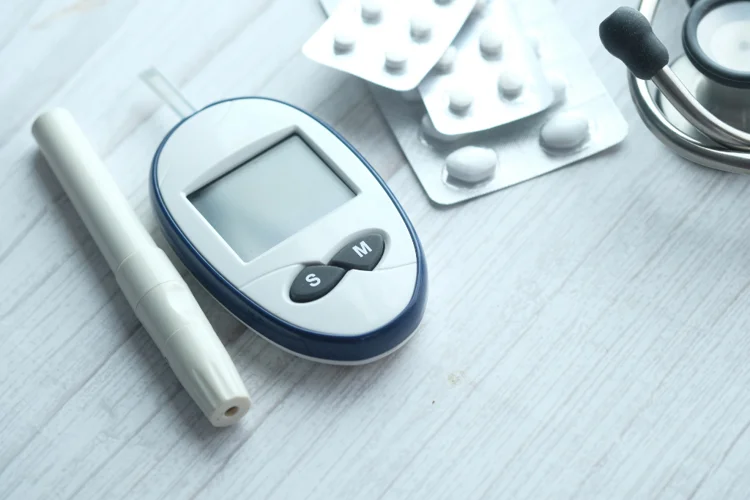Diabetes Medication
Last updated: Feb 20, 2026
Diabetes is a chronic condition that requires consistent management to
prevent complications such as cardiovascular
disease and kidney damage.
While diet and regular exercise are important, some individuals may need medication
to help control blood sugar levels when lifestyle changes alone are insufficient.
Diabetes medications work by targeting specific processes in the body, including
improving insulin sensitivity, stimulating insulin production, and reducing glucose
absorption.

What Does Diabetes Medication Do?
Diabetes medications help control blood sugar levels by targeting different processes in the body. Some medications reduce the amount of sugar produced by the liver, while others make the body more responsive to insulin, the hormone that regulates blood sugar. Certain medications help the pancreas release more insulin, and others remove excess sugar through urine or slow down the digestion of carbohydrates to prevent blood sugar spikes.
Diabetes Medication Classes
Diabetes medications are broadly categorised into two types: oral medications and injectables. These medications are primarily used to treat type 2 diabetes, with insulin being a key treatment for type 1 diabetes and advanced type 2 diabetes:
| Medication Type | Route | How They Work |
|---|---|---|
|
Biguanides
Examples: Metformin |
Oral | Reduces glucose production in the liver and improves the body's sensitivity to insulin, helping it use insulin more effectively. |
|
Sulfonylureas
Examples: Glimepiride, Gliclazide |
Oral | Stimulates the pancreas to release more insulin, increasing insulin levels to lower blood sugar. |
|
Dipeptidyl Peptidase-4 (DPP-4) Inhibitors
Examples: Sitagliptin, Linagliptin |
Oral | Increases insulin production and reduces glucose production in the liver by regulating a hormone called incretin. |
|
Sodium-glucose co-transporter-2 (SGLT2) Inhibitors
Examples: Dapagliflozin, Empagliflozin |
Oral | Blocks the reabsorption of glucose in the kidneys, promoting its excretion through urine. |
|
Thiazolidinediones
Examples: Pioglitazone |
Oral | Improves the body's response to insulin by increasing insulin sensitivity in muscle and fat tissue. |
|
GLP-1 Receptor Agonists
Examples: Liraglutide, Semaglutide |
Injectable | Mimics glucagon-like peptide-1 (GLP-1), a natural hormone that stimulates insulin production, suppresses glucagon, and reduces appetite to improve blood sugar control. |
| Insulin | Injectable | Replaces or supplements the body's natural insulin to regulate blood sugar levels effectively. |
| Combination Medications | Oral | Combines two or more active ingredients to target multiple pathways of blood sugar regulation. |
Your doctor will select the most appropriate medication for you by considering factors such as your age, the type and severity of your diabetes, any existing health conditions, and your lifestyle. They will also evaluate potential side effects and how your body has responded to previous treatments to help manage your blood sugar levels effectively.
Potential Diabetes Medicine Side Effects
Diabetes medications, while essential for managing blood sugar levels, can sometimes cause side effects that vary in severity based on the type of medication and individual responses. Below are some common side effects associated with different classes of diabetes medications:
| Medication Type | Common Side Effects |
|---|---|
| Biguanides | Digestive issues such as nausea, diarrhoea, or bloating, especially during initial use. |
| Sulfonylureas | Risk of low blood sugar (hypoglycaemia) and potential weight gain. |
| DPP-4 Inhibitors | Occasional headaches or joint pain. |
| SGLT2 Inhibitors | Increased risk of urinary tract infections due to higher glucose levels in the urine. |
| Thiazolidinediones (TZDs) | Fluid retention and weight gain in some cases. |
| GLP-1 Receptor Agonists | Nausea and reduced appetite, particularly at the start of treatment. |
| Insulin | Risk of hypoglycaemia if dosages are not carefully managed. |
Disclaimer: This is not a comprehensive list of all possible side effects, and actual effects may vary depending on the specific medication and individual response. This information is not meant to replace professional medical advice. Always consult your doctor regarding your treatment and to address any concerns about side effects or medication management.
Lifestyle Modification for Diabetes Mellitus
While some people require medication to manage diabetes, combining it with healthy lifestyle changes can help achieve more effective results. These lifestyle adjustments can help:
- Eat a Balanced Diet: Consuming whole grains, lean proteins, fruits, and vegetables while limiting sugary foods helps stabilise blood sugar levels and provide essential nutrients for overall body function and energy.
- Engage in Regular Physical Activity: Exercise improves insulin sensitivity and helps lower blood sugar levels while supporting overall cardiovascular health.
- Maintain a Healthy Weight: Achieving and maintaining a healthy weight reduces insulin resistance and makes blood sugar management easier.
- Manage Stress Levels: Reducing or managing stress and ensuring adequate sleep prevents stress-related blood sugar fluctuations.
- Moderate Smoking and Alcohol Intake: Limiting alcohol and avoiding smoking supports better blood sugar control and reduces the risk of diabetes-related complications.

How Much Is Diabetes Medication?
At ATA Medical, we offer screening and treatment for diabetes, as well as management of related complications such as diabetic retinopathy and foot conditions. Our treatment prices are as follows:
| Treatment | Price* |
|---|---|
| Consultation | From $49.05 |
| Diabetes Medications | From $0.22 |
^Prices last updated on Jan 28, 2026. While every effort is made to keep pricing information up to date, please contact our team to confirm the latest rates.
Where to Get Diabetes Medication?
ATA Medical @ Tanjong Pagar
Nearest MRT: Tanjong Pagar Station (EW15)
Contact Number: 6223 0682
Email: hi@atamed.sg
Opening Hours:
Mon - Fri: 8:30 AM to 12:30 PM, 1:30 PM to 5:30 PM
Sat: 8:30 AM to 12:30 PM
Sun & PH: Closed
ATA Medical @ Orchard
Nearest MRT: Orchard Boulevard Station (TE13)
Contact Number: 6223 0682
Email: camden@atamed.sg
Opening Hours:
Mon - Fri: 8:30 AM to 12:30 PM, 1:30 PM to 5:30 PM
Sat: 8:30 AM to 12:30 PM
Sun & PH: Closed
ATA Medical @ Jurong
Nearest MRT: Jurong East MRT Station (NS1/EW24)
Contact Number: 6348 6292
Email: jurong@atamed.sg
Opening Hours:
Mon - Fri: 8:30 AM to 12:30 PM, 1:30 PM to 5:30 PM
Sat: 8:30 AM to 12:30 PM
Sun & PH: Closed


